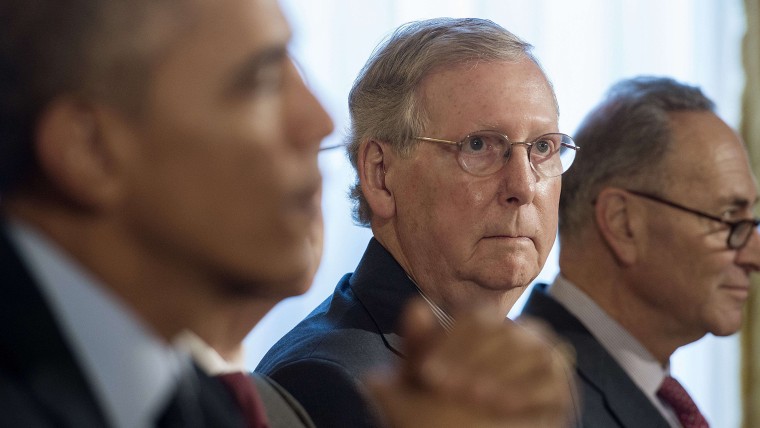Republican leaders in Congress have already said they intend to invest energy next year in trying to tear down the Affordable Care Act, it's
many,
many successes notwithstanding. Those efforts, however, will inevitably fail.
For one thing, there's obviously no way President Obama would cooperate with the destruction of his own historic accomplishment that's helping so many millions of families. For another, plenty of GOP lawmakers have
made clear they
no longer see much of a point to the repeal crusade, and they've grown weary of repeated votes to take away Americans' health care benefits.
Sure, Republicans will go through the motions and bring up repeal measures -- these guys
seem to love doomed legislation designed to make the GOP feel better -- but there's a broad realization that Congress' repeal push had run its course.
And for incoming Senate Majority Leader Mitch McConnell (R-Ky.), that's no great loss, because he thinks his allies on the Supreme Court may deliver the fatal blow that congressional Republicans cannot.
Asked this week about the future of the ACA, the Republican leader
conceded to the
Wall Street Journal's Gerald Seib that legislative efforts will fall short. He added, however:
"Who may ultimately take it down is the Supreme Court of the United States. I mean there's a very significant case that will be decided before June on the question of whether the language of the law means what the language of the law says, which is that subsidies are only available for states that set up state exchanges. Many states have not. If that were to be the case, I would assume that you could have a mulligan here, a major do-over of the whole thing -- that opportunity presented to us by the Supreme Court, as opposed to actually getting the president to sign a full repeal, which is not likely to happen."
That's no small acknowledgement. University of Michigan Law Professor Nicholas Bagley
told Greg Sargent this week, "McConnell confirms here that the litigation is politics by other means. It sounds like McConnell is treating the Supreme Court as another political institution."
I can appreciate why this may sound like a dog-bites-man observation. Of course McConnell is looking for partners in crime. Of course he wants far-right justices to put politics over the law, operating in bad faith. Of course he sees the Supreme Court as a political institution engaged in a larger partisan war.
But congressional leaders are generally not in the habit of making acknowledgements like these out loud.
Brian Beutler had
a good piece on the possible implications of McConnell's candor.
[E]ven if this isn't a big "a-ha!" moment, it does lay bare, for any of the justices listening, just how Republicans in Congress will react to an adverse ruling. And that could limit the arguments conservatives resort to when the Court rules in this case next year. Chief John Roberts, for instance, has a penchant for making naive political arguments -- about racism, or money in politics -- to support controversial decisions. But he can't now, in good faith, argue that Congress will clean up the mess if his Court voids subsidies in Healthcare.gov states. He could decide that the isolated phrase "Exchange established by the State" means what it says, and, while plainly a mistake, it's not the Court's job to fix drafting errors. But he can't pretend not to know that Congress has no intention of fixing it either. That McConnell's now publicly announcing he'll use a ruling along those lines as an "opportunity presented to us by the Supreme Court" for a "major do over" should at least make Roberts uncomfortable.
I think that's right, though Brian may be understating matters. Greg Sargent
explained that McConnell flatly described the pending case "as a substitute means through which an end -- repeal -- will be accomplished." Republican lawmakers failed to secure this accomplishment through the legislative process, so McConnell and his pals now want five Republican justices to forgo precedent, norms, and intent to finish the GOP's goals.
Call me old fashioned, but I don't think that's what the Supreme Court is for.
